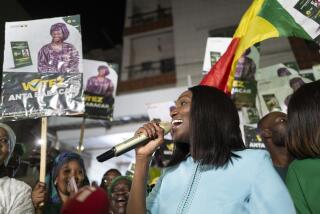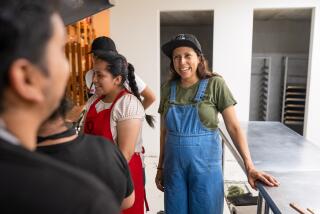Peace prize winner to seek presidency
- Share via
MEXICO CITY — Rigoberta Menchu, the Nobel Peace Prize winner and Maya Indian who has long been a symbol of indigenous pride and defiance, has announced that she will be a candidate in Guatemala’s presidential election.
Menchu, 48, made the announcement after meeting late Wednesday with Nineth Montenegro, a respected human rights activist and leader of the Encounter for Guatemala political party. Menchu will be the party’s candidate in the September election.
Seen by many in Guatemala as a polarizing figure, Menchu told reporters that she would run as a candidate of reconciliation and unity in a country where political and ethnic divisions have often played out violently.
“I am a woman of peace,” she said. “We should understand that extremism kills hope.”
Political analysts say Menchu will face an uphill battle in a campaign against at least seven opponents. She will be the candidate of a new party that has no electoral experience and only an incipient political apparatus.
“Rigoberta will be a key political figure in the next elections, but it will be difficult for her to surpass the other candidates,” said Luis Ochoa of the National Institute for Political Studies in Guatemala City.
At the moment, he added, “her chances for victory are minimal.”
Other analysts said Menchu might benefit from her status as the consummate outsider of Guatemalan political life. She could benefit from a wave of dissatisfaction with the crime that has beset Guatemala since the country’s civil war ended in 1996.
“The vote of undecided and frustrated voters could make an important difference,” said Rigoberto Queme, a Guatemalan anthropologist and political analyst.
No matter how Menchu fares in September, her candidacy will carry important historic and cultural overtones.
Indigenous people make up about half of Guatemala’s population but have been excluded from power and marginalized since Spain conquered the Maya in the 16th century.
No woman or indigenous person has ever been elected Guatemala’s president.
Menchu was born in 1959 to a peasant family in the Quiche region of western Guatemala. Her parents and several other family members were killed by security forces in Guatemala’s civil war in the 1970s and ‘80s.
The Guatemalan army was then waging a scorched-earth campaign against insurgents in which tens of thousands of people were killed. Menchu fled to exile in Mexico and recounted her family’s story in a 1983 book, “I, Rigoberta Menchu,” that made her an international spokeswoman for the Guatemalan left.
She was awarded the Nobel Peace Prize in 1992.
In 1999, American anthropologist David Stoll revealed that Menchu had exaggerated and misrepresented many elements of her autobiography. His findings caused a stir in academic circles, especially in the United States.
However, no one challenged the essence of her story -- that Guatemalan Indians suffered horrible repression -- and her influence in Guatemala and Latin America did not diminish significantly.
The prestige Menchu still enjoys among many Guatemalans, including non-Indians, is her chief political asset, Queme said.
“We’re a society that lives on the basis of symbols,” Queme said. “Being a Nobel Peace Prize winner has opened up a symbolic political space for Rigoberta in the last 10 years.”
Ochoa said Menchu’s candidacy was sure to provoke a hostile reaction from many of Guatemala’s non-Indians.
“Her speeches are very confrontational,” pitting indigenous people against Ladinos, or mixed-race people, Ochoa said.
Queme disagreed. Many indigenous people see Menchu as a moderate figure, he said. In 2004, she accepted an appointment by conservative President Oscar Berger as Guatemala’s “goodwill ambassador” to UNESCO, a position she resigned Thursday.
Non-Indians think Menchu is being confrontational because they are not used to hearing indigenous people argue forcefully for their rights, he said.
“Her discourse is one of protest, about the land and poverty,” Queme said. “The problem is there is a lot of prejudice.”
Special correspondent Alex Renderos in San Salvador contributed to this report.
More to Read
Sign up for Essential California
The most important California stories and recommendations in your inbox every morning.
You may occasionally receive promotional content from the Los Angeles Times.














